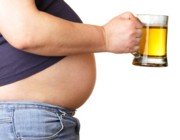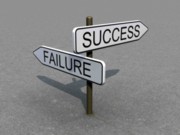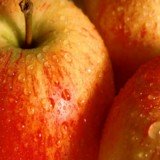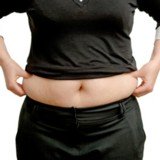Beer Calories
Introduction
Beer calories is not something most drinkers are most likely to think about before they drink. Did you know that alcohol has little if no nutrients at all. To top this, it has a lot of calories. Many of our teenagers today drink excessively. No wonder why cases of childhood obesity are on the rise. College students are not off the hook either.
 They are also another group of people who drink like it's going out of fashion, with parties going on just about every weekend. An important thing to note is that beer can cause you to gain weight.
They are also another group of people who drink like it's going out of fashion, with parties going on just about every weekend. An important thing to note is that beer can cause you to gain weight.
And this kind of weight gain can lead to obesity or being overweight, and gaining weight comes with a lot of health issues. You may learn about some of them in the article dangers of childhood obesity.
To get the total amount of beer calories you are packing into your body, simply multiply the number of beers you have had by the calories of each bottle. Imagine drinking six bottles a day of 12 ounces light beer which has about 110 calories or 12 ounces regular beer which has 150 calories.
That's a whooping 550 calories or 750 calories respectively from your daily calorie needs. So if you are on a 1800 calorie diet that will already be almost half, or half if you take the regular beer, of your calories for the day.
This means that chances of you eating healthy are greatly narrowed. So the result will definitely be serious weight gain, and not forgetting that beer belly! According to researchers, 125 liters or 33 gallons of alcohol are consumed each year per person in the United States alone, for those age 18 years going up! And this was just 5 years ago. So surely by now with the way things stand it's more than that, shockingly and sadly so.
A few facts about drinking alcohol:
- Alcohol lowers blood sugar levels. When this happens signals are then sent to your brain reporting that you are hungry thus making you more inclined to eat. And obviously this leads eating more than you need and ultimately obesity. In fact, some studies have shown that there was a 20% increase in calories consumed at a meal when alcohol was consumed before a meal. There was a total of 33% increase in calories when beer calories where added.
- Alcohol causes dehydration so it's important that you drink a lot of water to keep yourself hydrated.
- One serving of beer is 12 ounces, one serving of wine is 3 ounces and one serving od hard liquor is 1.5 ounces.
- Prolonged high doses of alcohol leads to hypertension and the risk for heart disease. On the other end of the scale, low doses of alcohol can decrease blood pressure. So when you look at it, you are better off not drinking at all.
- Alcohol depresses areas of the brain that control breathing. Excessive doses can lead to respiratory arrest.
- Alcohol causes your pancrease to secrete too much insulin. When this happens, it leads to a low blood sugar level and that will in turn lead to low energy levels.
- Alcohol interferes with the kidney's ability to absorb water. This in turn causes urination and dehydration.
- Alcohol stimulates the secretion of hydrochloric acid which irritates the stomach lining. This may lead to heartburn, nausea or vomiting.
- Alcohol also causes lactic acid to accumulate. This impairs the liver's ability to metabolize sugar.
- When it comes to the skin, alcohol causes blood vessels near the surface to expand. This leads to heat loss and lower body temperature.
When it comes to beer, generally there are three types which are sold. These are regular, light and non-alcoholic. Light beer has less alcohol and fewer beer calories as compared to regular beer. They are often around 102-115 calories.
Non-alcoholic beer is intended for people who desire little or no alcohol and therefore has less than a half percent of alcohol. Regular beer has about 5% alcohol and 43 beer calories per 100ml or about 150 calories per 355ml. Darker beer such as cream ales and stouts can have as many as 205 beer calories in just 355ml, that is 12 ounces.
Beer Calories Per Bottle and Per Ounce
| Name of Beer | Volume | Calories |
| Heineken | 12oz (355ml) | 150 |
| Bud Light | 12oz (355ml) | 110 |
| Molson Canadian | 12oz (355ml) | 153 |
Beer Calories List Chart ABV and Comparison including Corona and Guinness
This is based on a serving of 12oz
| Name of Beer | Alcohol By Volume (ABV) % | Calories |
| Anheuser Busch Natural Light | 4.20 | 95 |
| Amstel Light | 3.90 | 95 |
| Corona Light | 4.10 | 99 |
| Heineken Special Light | 3.80 | 99 |
| Bud Light | 4.20 | 110 |
| Miller Chill | 4.20 | 110 |
| Old Milwaukee Light | 3.80 | 114 |
| Sam Adams Light | 4.05 | 124 |
| Guinness Draught | 4.20 | 126 |
| Milwaukee's Best | 4.30 | 128 |
| Carling Black Label | 4.30 | 138 |
| Budweiser | 5.00 | 145 |
| Yuengling Ale | 5.00 | 145 |
| Schlitz Beer | 4.70 | 146 |
| Weinhard's Pale Ale | 4.60 | 147 |
| Corona Extra Beer | 4.60 | 148 |
| Coors | 4.91 | 149 |
| Heineken Lager | 5.00 | 150 |
| Blatz Beer | 4.80 | 153 |
| Guiness Extra Stout | 6.00 | 153 |
| Molson Canadian Lager | 5.10 | 153 |
| Anchor Stream | 4.90 | 153 |
| Michelob Beer | 5.00 | 155 |
| Anheuser Busch Natural Ice | 5.90 | 157 |
| Molson Golden | 6.04 | 170 |
| Heineken Special Dark | 5.10 | 170 |
| New Belgium 1554 | 5.60 | 205 |
| Flying Dog Dog Schwarz | 7.80 | 222 |
| McEwans Scotch Ale | 9.50 | 295 |
| Sierra Nevada Bigfoot | 9.60 | 330 |
 In conclusion, although it is said that it is not realistic to stop drinking completely. We don't completely agree with that point of view.
In conclusion, although it is said that it is not realistic to stop drinking completely. We don't completely agree with that point of view.
As with anything in life, you can achieve and do just about anything you want to as long as you have determination, inspiration, inner strength and motivation.
There are those who have managed to quit smoking completely and this in itself should be inspiration to anyone who wants to stop drinking alcohol.
You can set goals and targets for yourself to help you out. There are also plenty of support systems that have been developed to help you.
So go ahead and make the decision and we know you can do it. It's achievable, attainable nd possible. Go for it, YES YOU CAN!!
More Beer Calories Categories
 Alcohol is one of the most favored drinks in the world today. It has in fact been ranked the third most drank beverage after water and tea! But what is it that we find it alcohol? This article covers alcohol nutrition facts, vodka, wine, hard, tilt, jack daniels, sparks and health effects.
Alcohol is one of the most favored drinks in the world today. It has in fact been ranked the third most drank beverage after water and tea! But what is it that we find it alcohol? This article covers alcohol nutrition facts, vodka, wine, hard, tilt, jack daniels, sparks and health effects.


